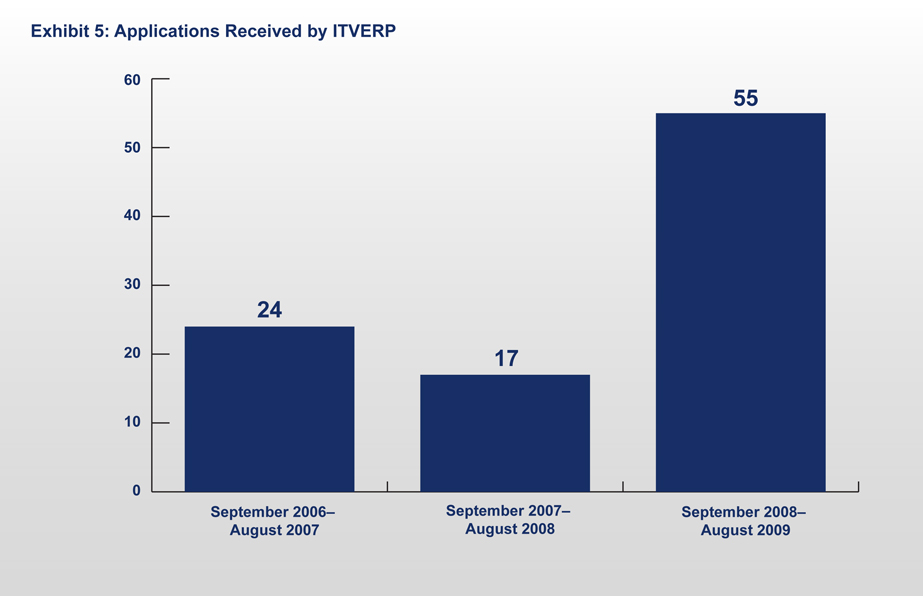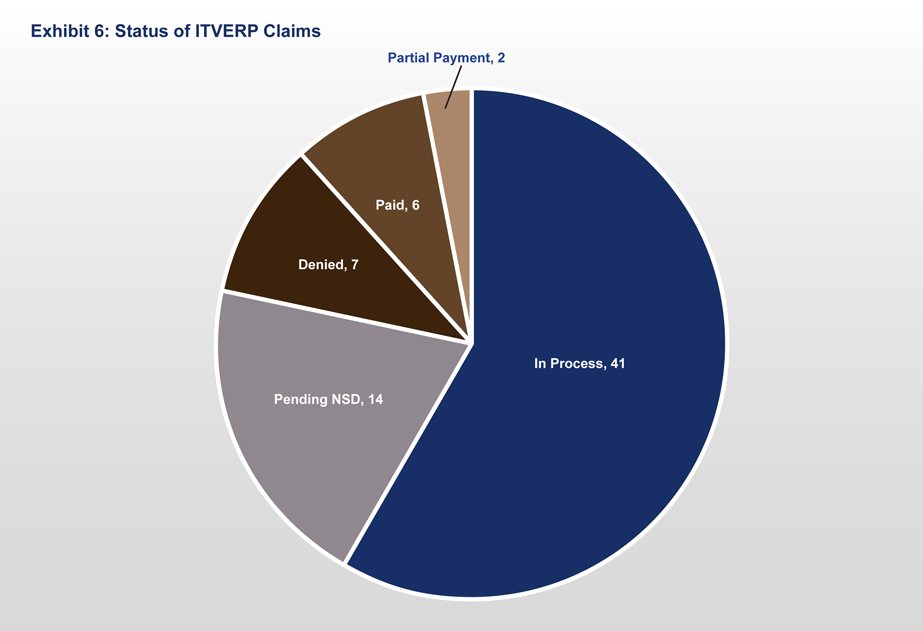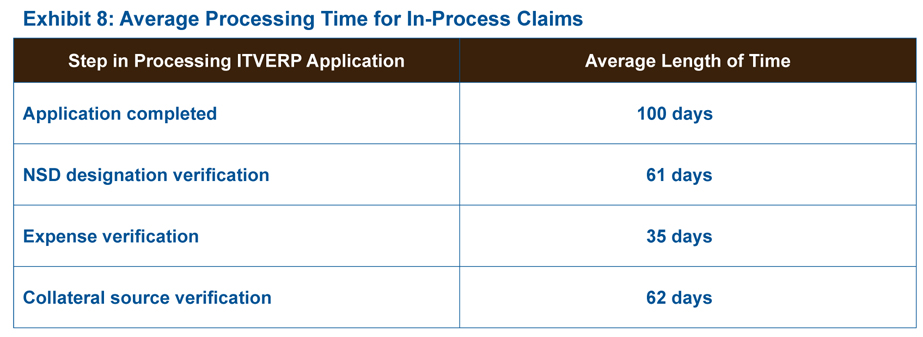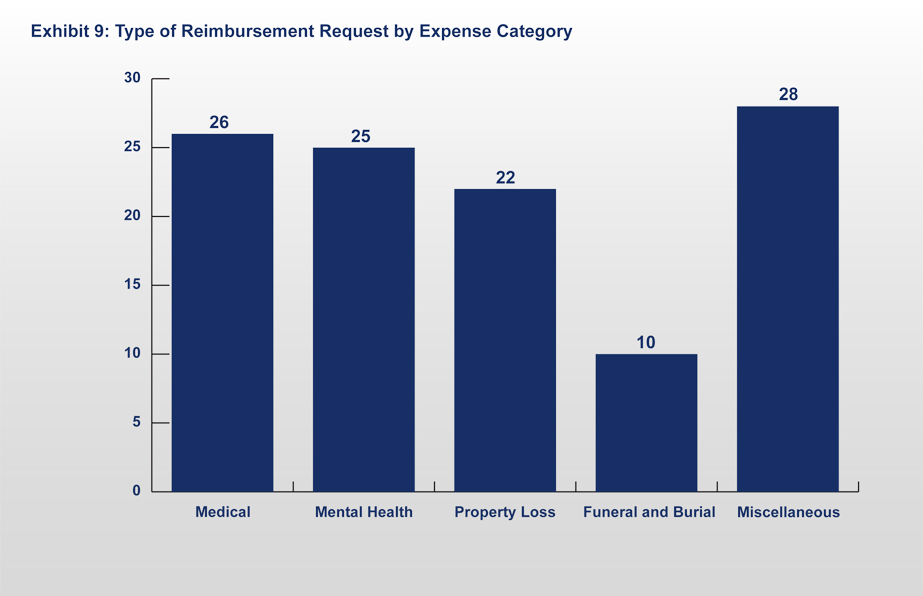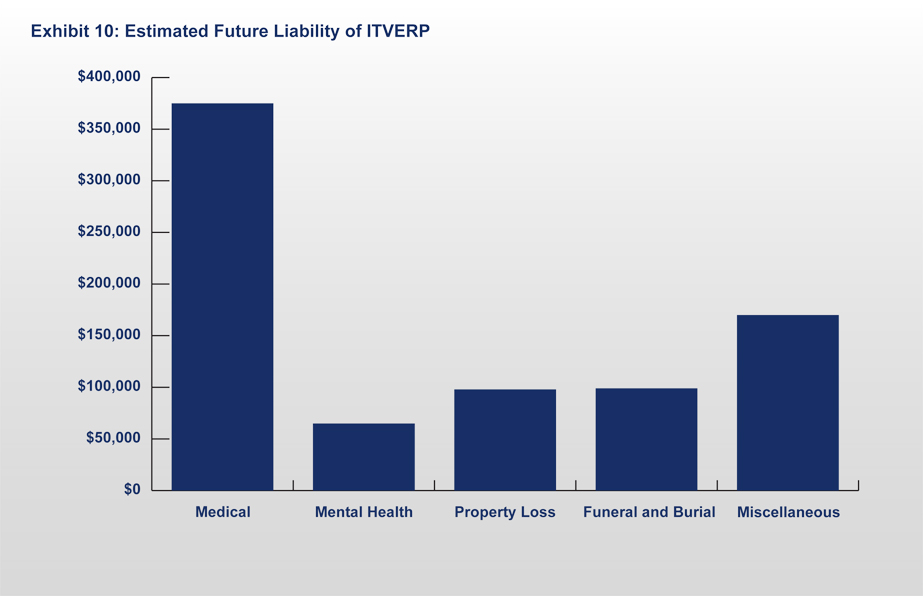ITVERP Assistance and Outreach
This report provides a summary of International Terrorism Victim Expense Reimbursement Program (ITVERP) activities during the September 2008 through August 2009 reporting period. It covers two main areas of ITVERP assistance—application processing and claims payment, and public awareness activities undertaken to reach out to potential claimants. A discussion of future program needs and improvements is included at the end of the report.
Reimbursement Activities
This section highlights the activities and accomplishments related to ITVERP’s main function of processing applications for reimbursement, including—
- The number of applications received;
- The status of the claims;
- The current processing time for claims;
- Details regarding reimbursements paid to claimants; and
- The number of appeals under the program to date.
Applications Received and Processed
During the reporting period, ITVERP received 55 new applications for reimbursement. The applications reflect terrorist attacks dating from June 14, 1985, to January 4, 2009. Exhibit 5 illustrates the number of applications received during each ITVERP reporting period since the start of the program in 2006.
Status of Claims
As claims reach certain phases in the application process, OVC assigns them one of several statuses. Frequently, applicants initiate the application process but do not supply complete information. Applicants have 120 days from the time ITVERP receives their initial application to provide the necessary information or their claim will become inactive. Once a complete application is submitted, the claim becomes active. Active claims may be in process for several weeks while eligibility and expenses are verified, additional information is requested, the incident related to the application is pending designation, and so forth. A claim is considered partially paid or paid after a claimant receives payment. A claim that does not meet the eligibility requirements is denied.
At the end of the reporting period, there were 57 active claims—41 claims in process, 14 claims pending NSD designation, and 6 paid claims, 2 partially paid claims, and 7 denied claims. No claims were designated inactive/unresponsive during the reporting period. Exhibit 6 presents the status of all ITVERP claims that had action taken during the reporting period, including claims that were submitted during a prior reporting period.
Processing Time
Processing ITVERP claims requires verification of claimant eligibility and that the expenses submitted are processed in compliance with the ITVERP regulations. Denied claims typically require less time to process than those that are found to be eligible for reimbursement because the factors that make the claim ineligible (e.g., claimant does not meet eligibility requirements) are identified in the initial steps of the claims process.
Exhibit 7 shows the average length of time required (in calendar days) to process the six paid claims and the seven denied claims processed during the reporting period. Exhibit 8 shows the average length of time required (in calendar days) to complete each step in the application process for claims that were in process during this reporting period. Each step in the application process occurs concurrently.
Types of Reimbursement Requests
Potential claimants who have incurred multiple expenses as a result of their victimization may apply for reimbursement in more than one expense category. ITVERP case managers work closely with claimants and potential claimants to assess and fully identify their needs to ensure they receive the maximum reimbursement allowable. Exhibit 9 shows the number of reimbursements requested, by category, by claimants during the reporting period; many claimants applied for reimbursement under multiple expense categories.
Reimbursements Paid
During the reporting period, OVC paid out seven requests for reimbursement to six claimants, totaling $51,873 [1]. One claimant received payment as part of both an interim emergency claim and a supplemental claim.
Appeals
Under ITVERP regulations, claimants may file an appeal within 30 days of receipt of a final determination of their claim. During this reporting period, no claimant filed an appeal.
Future Liability
In process claims represent an estimate of ITVERP’s future liability. If all in process claims are paid at the amounts requested, ITVERP’s future liability is $823,320 [2]. Exhibit 10 shows ITVERP’s estimated future liability by type of reimbursement.
Promoting Public Awareness
After experiencing a terrorist incident, those affected must focus on the immediate medical, mental health, family, housing, and other needs of themselves and their loved ones. Many victims and/or their families are not aware of the resources available to them. A critical component of ITVERP includes outreach to inform victims of international terrorist incidents and their families of the assistance this program offers. Outreach activities are focused on two primary groups: potential claimants, and collaborating agencies and organizations that may have contact with potential claimants. This section details the outreach efforts that took place during the reporting period and provides information on the ITVERP Resource Center.
Outreach to Potential Claimants
ITVERP outreach efforts focus on victims of international acts of terrorism and their family members who may be eligible for reimbursement under the program. OVC coordinates with OVA and the U.S. Department of State (DOS) to identify potential claimants. When terrorist incidents occur outside the United States and involve U.S. citizens, DOS is the first to respond, locating and identifying the victims. DOS coordinates and communicates with OVA, which provides immediate and ongoing victim assistance support to victims and their family members. Where appropriate, OVA identifies ITVERP as a potential resource and provides victims or their family members with program information.
This interagency coordination enhances OVC’s outreach efforts and gives potential claimants access to much needed resources. During the reporting period, OVC, OVA, and DOS coordinated their efforts to identify and reach out to 891 potential claimants. With materials provided by OVC, DOS and OVA were able to disseminate ITVERP information in the immediate aftermath of the attacks in Mumbai, India, in 2008.
The attacks in Mumbai initiated the first multiagency collaborative response to a major terrorist attack since the start of the program. Often the enormity of an act of terrorism will affect the response—in Mumbai, the post-attack collaboration and communication set the standard for future responses. The incident received NSD designation on December 1, 2008, just days after the attacks. With information provided by the FBI, OVC proactively reached out to the victims of the attacks to explain the benefits provided under ITVERP. Similarly, OVC coordinated with the applicable state compensation programs to coordinate state compensation and ITVERP reimbursements to the victims of the attacks. Based on OVC outreach efforts, 91 application packets were sent out to victims, and 15 of those individuals applied to the program.
Outreach to Collaborating Agencies and Organizations
Another goal of outreach efforts is to educate the victim assistance community, including collaborating agencies and potential partners, about ITVERP. By reaching out to national and international organizations, and individuals who may come into contact with victims of international terrorism, OVC greatly increases awareness about ITVERP and the resources available.
Program outreach activities targeted towards collaborative agencies and potential partners during the reporting period included the following:
- Information dissemination to international groups such as the Ministry of Foreign Affairs of Japan and the Independent Institute of Japan.
- Coordination with OVC’s Training and Technical Assistance Center and the OVC Resource Center to support ITVERP outreach efforts at several national conferences.
- Dissemination of updated ITVERP information to federal partners, including the FBI, NSD, and DOS.
- Enhanced coordination with the National Association for Crime Victim Compensation Boards (NACVCB). Outreach efforts included an e-mail to more than 100 compensation professionals updating them on the ITVERP program, specifically application and eligibility deadlines; an article on ITVERP published in an issue of the NACVCB quarterly newsletter distributed to all state compensation programs; and presentations and the dissemination of ITVERP outreach materials at two NACVCB regional training conferences.
- OVC participation on the Victims of Terrorism Abroad Task Force, which meets quarterly and comprises representatives from DOJ, the FBI, and DOS.
- ITVERP briefings for nongovernmental organizations (NGO) and government agencies, including the U.S. Geological Survey.
ITVERP distributed outreach materials at a number of national and international conferences and meetings, including the following:
- National Institute of Justice Conference, June 2009, in Alexandria, Virginia.
- Annual Conference and Exposition of the International Association of Campus Law Enforcement Administrators, June 2009, in Quebec City, Quebec, Canada.
- National Crime Victim Law Institute Crime Victim Law & Litigation Conference, June 2009, in Portland, Oregon.
- National Center for Victims of Crime National Conference, June 2009, in Washington, D.C.
- National Organization of Black Law Enforcement Executives Conference, July 2009, in Norfolk, Virginia.
- National Victim Assistance Academy IV, August 2009, in Louisville, Kentucky.
- National Organization for Victim Assistance Conference, August 2009, in Scottsdale, Arizona.
- World Society of Victimology International Symposium on Victimology, August 2009, in Mito, Japan.
ITVERP Resource Center
The ITVERP Resource Center responds to questions and requests made through its dedicated toll free hotline at 1-800-363-0441 and its e-mail address. Program staff are available to respond to inquiries Monday through Friday between the hours of 8:30 a.m. and 5:30 p.m. eastern time. Federal, state, and local government agency staff contact the Resource Center to obtain information regarding the program’s rules and eligibility on behalf of specific victims, and to provide information about potential claimants and particular terrorist incidents that might qualify for ITVERP reimbursement. Similarly, NGOs contact the ITVERP Resource Center to obtain information about the program to include in their own outreach efforts.
All congressional inquiries received by OVC are promptly directed to OJP’s Office of Communications. During the reporting period, OVC received two written inquiries from congressional offices requesting information on specific ITVERP claims submitted by their constituents. The written responses were completed within 2 weeks of receipt of the inquiries.
ITVERP Online
Claimants and potential applicants can obtain information about the program, including eligibility criteria, reimbursable expenses, and instructions for filing an application, through the ITVERP Web page. Potential claimants can download the application for reimbursement, checklists, and supporting documents directly from the site, which also provides a list of answers to frequently asked questions to assist with the application process. During the reporting period, OVC enhanced the page to include an updated list of NSD-designated terrorist attacks.
Future Program Needs and Improvements
Although important achievements have been made through the establishment of ITVERP, we must continue to ensure that resources are made readily and easily accessible to victims and their families. During this past year, OVC has learned valuable information that will guide future enhancements to ITVERP.
First and foremost, customer service and communication with claimants is paramount. OVC will continue to improve customer service, including reviewing the ITVERP claim process and improving staff communication with victims and their families applying for reimbursement. Additionally, OVC recognizes the importance of collaborating with other agencies and organizations and will continue to expand its partnership network.
As OVC continues to assist victims and their families in the aftermath of international terrorist incidents, it is necessary for ITVERP to further refine and enhance its outreach and customer service efforts. In the coming year, OVC will focus on enhancing several program areas, including outreach efforts to victims of terrorist incidents occurring outside the United States and their families, coordination with state compensation programs, and coordination with other federal agencies and organizations.


